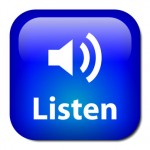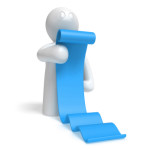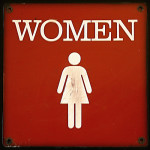After 10 years of not being able to rid myself of anxiety I’ve learned a lot. And perhaps one of the most significant lessons I’ve learned about anxiety is that much of my own anxiety is self inflicted and habitual. It sucks to say but it seems to me that at times I’m my own worst enemy.
The fact that fear can even be habitual is not surprising when you think about it. I think the same can be said of any thought or feeling that evokes an intense emotional reaction. For example, if someone tells themselves that they are fat, well eventually they will believe it whether it’s true or not.
Thoughts and ideas that are repeated over a long period of time tend to imprint themselves on our subconscious mind which later causes these ideas, thoughts, and related feelings to replay automatically in the background. So when we have an anxious thought or anxiety symptom the “stored” response or subconscious imprint adds fuel to the initial fear or sensation.
As a result of the above I’ve become a total anxiety junkie. I hate to feel anxious and I also hate all the associated symptoms, but it seems to me that I’m always searching my mind for anxiety like radar looks for planes in the sky, just scanning constantly.
I also don’t want to exaggerate I do have long periods of time when I’m not anxious and don’t think about anxiety as well but eventually, whether I’m thinking about it or not, it tends to come back. I truly believe that much of my own suffering has been kept alive by my own failure to challenge my subconscious fear, essentially I have failed to stop scaring myself.
I just wanted to mention this because I feel that we all would do better if we stop our habit of fear. When someone has anxiety they assume a lot, like the idea that their anxiety is progressive and always getting worse. I’m guilty of this as I’ve gone from one body part to another in search of the next site of anxious focus in the span of a day. And all the while knew what I was doing was ridiculous. The same can be said of the mind since we tend to jump from one negative thought to another in hopes of discovering just what the hell is really causing all this turmoil.
And although we all understand that any anxiety disorder is complex and based on multiple factors, the habit of fear helps to sustain it even if it does not cause it. As many of you know I’m in the throes of a particularly nasty spell of anxiety right now and although it is tremendously unpleasant it’s made me think a lot lately about my own anxiety disorder in a deeper way.
I know I don’t talk a lot about my own anxiety condition because I’m focused on giving advice and making sure other people are functional in their own lives, but I realized how truly habitual I have been with my own nervous illness. I’ll go for weeks without any sign of anxiety, only to become anxious once again with no real cause. And instead of facing the anxiety I simply go to distraction to escape until it leaves me.
But instead what I should have been doing is just accepting it. Not accepting it has caused my body to remain in a constant state of adrenaline production and fatigue. In this state, when the mind is tired and the body worn down, those horrifying thoughts and feelings we sometimes have intensify and last longer. But this is precisely the time to accept it all, not fight.
I’ve been struggling between acceptance and fighting anxiety for a decade. For some reason I’ve never really truly hunkered down and allowed anxiety to consume me without the habitual fear that I add myself thereby keeping my anxiety alive to begin with. It is a painful struggle.
In the past I’ve thought I was accepting but in retrospect perhaps I was doing so half heartedly, not with everything I had. I just seemed to of failed in releasing the tense hold I have on myself over the long term.
Because of all the things I’ve learned and written regarding anxiety disorders I also learned how to maintain my life in regular terms. That is I have a family, full time job, and interest I pursue. Sometimes I get lost in this “normal” living and forget to address my anxiety even when it’s not present, I forget to address my habit of fear. It is when the mind is quiet that one should address their subconscious fears to rewrite the fallacies created during panic attacks and countless false alarms of all kind.
Simply put you have to think to yourself and tell yourself that your fears as they relate to anxiety are untrue. Affirmations must be created and repeated to undo all the months or even years of fear conditioning. You have to challenge the notion that anxiety causes death, illness, or insanity. And this should be done not when you’re freaking out with panic, but when you’re calm and unaffected by fear.
I’m using my own situation as an example because I wanted to highlight that maybe we are not as sick as we think, but also not as well off as we should be either. The habit of fear, the habit of looking for something to fear, a symptom to blame, a new disease to ponder, this is what needs to be eliminated.
We need to rid ourselves of thinking that just because anxiety is in us and provokes fear that we should somehow just give into fear thinking and anticipation. Personally I plan to rededicate myself to truly accepting my own fears. This will not cure my or anyone’s anxiety, as this may or may not be possible, but it will help to not add more fear and sustain the horrible habit of fear.
I’ve wrongly concluded that because I rarely have panic attacks anymore that I’ve won. That anxious thinking alone isn’t as bad. But this it turns out is a complete lie, a lie I told myself so that I didn’t have to deal with the real issue – fear. Again, the anxiety impluse might remain for my entire life, but I know I can improve my reaction to it. To not just tell myself to accept and go through the motions, but to truly let go. We will see.





Anxiety disorders are astonishingly common. They include Panic, Phobias (including Agoraphobia and Social Phobia), Obsessive Compulsive Disorder, and Generalised Anxiety Disorder. For many people self-help is a viable way forward and this is why we wrote our book Free Yourself from Anxiety. We aim to show you, step-by-step, how to set up and follow an individually tailored self-help programme.
Part one looks at lifestyle, because very often the way you live is contributing to Anxiety. By making simple changes you can get yourself fit and ready to tackle your Anxiety driven behaviours.
Part two shows you how to challenge your Anxiety in a safe controlled way, by setting small goals that take you gradually towards letting go of anxious behaviours.
Part three shows you how to recognise your anxious thinking, challenge it, and ultimately change it.
Part four explains how to delve into some of the deeper issues that may be driving Anxiety. We also suggest where it might be appropriate for you to seek professional help.
Our aim in this book is to be as comprehensive as possible. Each reader will be able to decide which aspects of the recovery programme they need to complete and which are not relevant to them. In addition we have only discussed proven safe techniques.
Throughout the book we have used the words of Anxiety sufferers who are in various stages of recovery to illustrate our points
The authors
Emma Fletcher is a UK-registered counsellor with 20 years experience of helping anxiety sufferers and of training counsellors and volunteers on anxiety help-lines. She remains firmly committed to the self-help principle and believes that much of her work consists of giving her clients the tools to enable them to live more effectively. This book is an attempt to bring those tools to a wider audience.
Martha Langley is a professional writer and journalist. She has more than 10 years experience as a volunteer on helplines for people dealing with Anxiety and has also been a one-to-one mentor and recovery group leader. This has given her an insight into the difficulties faced by people trying to put self-help techniques into practice. Her aim in Free Yourself from Anxiety was to explain these techniques, to explain the reasoning behind them, and to make practical suggestions that will give every reader the best chance of recovery.
Free Yourself From Anxiety ISBN 978-1- 84528-311-7 is available from bookshops, book websites and Amazon US on
https://www.amazon.com/Free-Yourself-Anxiety-self-help-overcoming/dp/1845283112/ref=sr_1_4?ie=UTF8&s=books&qid=1247762277&sr=8-4 or Amazon UK on
https://www.amazon.co.uk/Free-Yourself-Anxiety-Self-help-Overcoming/dp/1845283112/ref=sr_1_1?ie=UTF8&s=books&qid=1233135806&sr=1-1
This post really hits home. Especially “The habit of fear, the habit of looking for something to fear, a symptom to blame, a new disease to ponder, this is what needs to be eliminated.”
I completely agree. I spend so much time “fearing” that it can totally distract me from being productive and living in the now. If I could just accept that everyone gets odd pains, twinges, and doesn’t always feel 100% and don’t become so focused worrying about it, I would do much better!
I’d like to agree with every single word Chuck said. I’ve got to work on eliminating my “habit of fear” but in the meantime it is SO nice just to know I’m not alone in this 🙂
Wow, I thought I was the only one that is scanning the mind for things to fear. It is a nasty mind ritual. Thanks for the post, it is liberating to know I am not the only one.
I some time feel angry with myself for, unconsciously processing information in my mind in such a way that it creates anxiety. Even when i know that such creations are illusory or unreal.